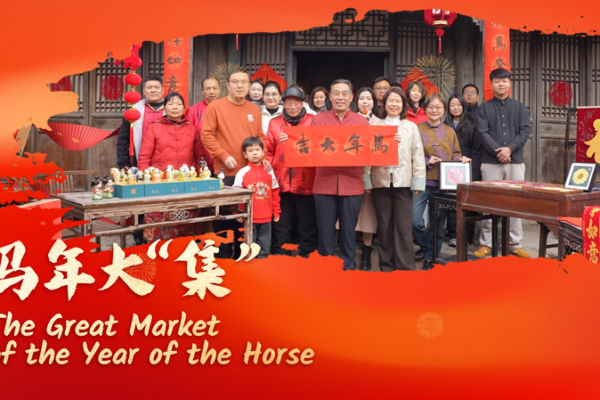
China’s Opera Fusion Celebrates Heritage and Modernity in 2026
Seven Chinese opera traditions unite in a modern musical tribute celebrating China’s cultural heritage and contemporary achievements in 2026.

2026 Spring Festival Gala Bridges Tradition and Tech Innovation
China’s 2026 Spring Festival Gala wows global audiences with cultural performances and breakthrough tech integration, reinforcing Lunar New Year traditions while showcasing innovation.

Ancient Huxuan Dance Revived for 2026 Spring Festival Celebration
CGTN and Honor of Kings revive ancient Huxuan dance through high-tech Spring Festival production, blending Tang Dynasty artistry with modern innovation.

‘The Horse Whisperers’ Reveals Timeless Bond Between Chinese Herders and Steeds
A new documentary explores the ancient bond between Inner Mongolian herders and horses, revealing cultural values resonating with Lunar New Year themes of continuity and harmony.

Humanoid Robots and Kung Fu Masters Dazzle at 2026 Spring Festival Gala
Humanoid robots and kung fu artists delivered a groundbreaking performance at China’s 2026 Spring Festival Gala, blending tradition with cutting-edge technology.

China’s Spring Festival 2026 Merges Tradition with Tech Innovations
China’s 2026 Spring Festival harmonizes ancient traditions with AI, VR, and holographic tech, creating new cultural experiences while preserving symbolic rituals.

Iran, IAEA Hold Technical Talks Ahead of Geneva Nuclear Negotiations
Iranian and IAEA officials hold technical discussions in Geneva ahead of crucial nuclear negotiations with the U.S., aiming for a fair agreement.

Celebrating the Year of the Horse: Traditions Light Up Chinese New Year 2026
As 2026’s Chinese New Year Eve unfolds, explore the vibrant traditions from red paper art to family dumpling-making, marking the Year of the Horse.

China’s Martial Arts Landscapes Inspire ‘Arknights’ Soundtrack Reimagining
China’s Cultural Passport project fuses iconic martial arts landscapes with reimagined soundtracks for the RPG Arknights, creating new bridges between tradition and technology.

Year of the Horse Markets Showcase China’s Cultural Vibrancy in 2026
2026 Lunar New Year markets blend tradition and modernity, showcasing China’s cultural resilience and economic innovation through vibrant Spring Festival celebrations.

Uygur Muqam Tradition Thrives in Xinjiang’s Heartlands
CGTN’s documentary explores how Uygur Muqam traditions thrive in Xinjiang, showcasing local artists’ dedication to preserving their cultural heritage.

Türkiye Launches Historic Offshore Drilling Mission in Somalia Waters
Türkiye deploys its deep-sea drilling vessel to Somalia, marking its first offshore exploration beyond its waters. The mission aims to bolster energy production and economic ties.

Europe’s Strategic Awakening Post-Munich 2026: Transatlantic Shifts
As the Munich Security Conference 2026 concludes, Europe faces a pivotal moment in redefining its role amid shifting U.S. priorities and growing calls for strategic autonomy.

Iran Launches ‘Smart Control’ Naval Drill in Strategic Strait of Hormuz
Iran’s IRGC conducts ‘Smart Control’ naval exercise in the Strait of Hormuz, testing readiness amid regional tensions. Key global oil chokepoint under focus.

Chimelong Ocean Kingdom Surpasses Global Rivals with 12.5M Visitors
Chimelong Ocean Kingdom attracts 12.5M visitors in 2025, outpacing global rivals through innovative customer retention strategies in China’s Greater Bay Area.

China’s Economic Growth Fueled by Market Strength, Innovation in 2026
Chen Jiahe highlights China’s 2026 economic strategy, emphasizing market leverage and innovation to drive sustainable growth and global influence.

Nine Horses, One Legend: Artists Gallop into the Year of the Horse 2026
Nine artists blend traditional ink art with digital innovation to celebrate the 2026 Year of the Horse, creating a viral cross-cultural phenomenon.

Global Leaders Extend Year of the Horse Greetings to China
World leaders, including Putin and Lula, send Lunar New Year wishes to China, highlighting partnerships and cultural ties as the Year of the Horse begins.

2026 Spring Festival Gala Gallops Into Tech-Driven Future
The 2026 Spring Festival Gala combines cutting-edge technology with Year of the Horse symbolism, featuring AI-driven kinetic art and immersive digital environments.

China Launches Deep-Sea Expedition to Indian Ocean for Mineral Exploration
China’s Dayang-95 expedition embarks on a scientific survey of Indian Ocean seafloor minerals, combining resource assessment with environmental monitoring using advanced deep-sea technology.












